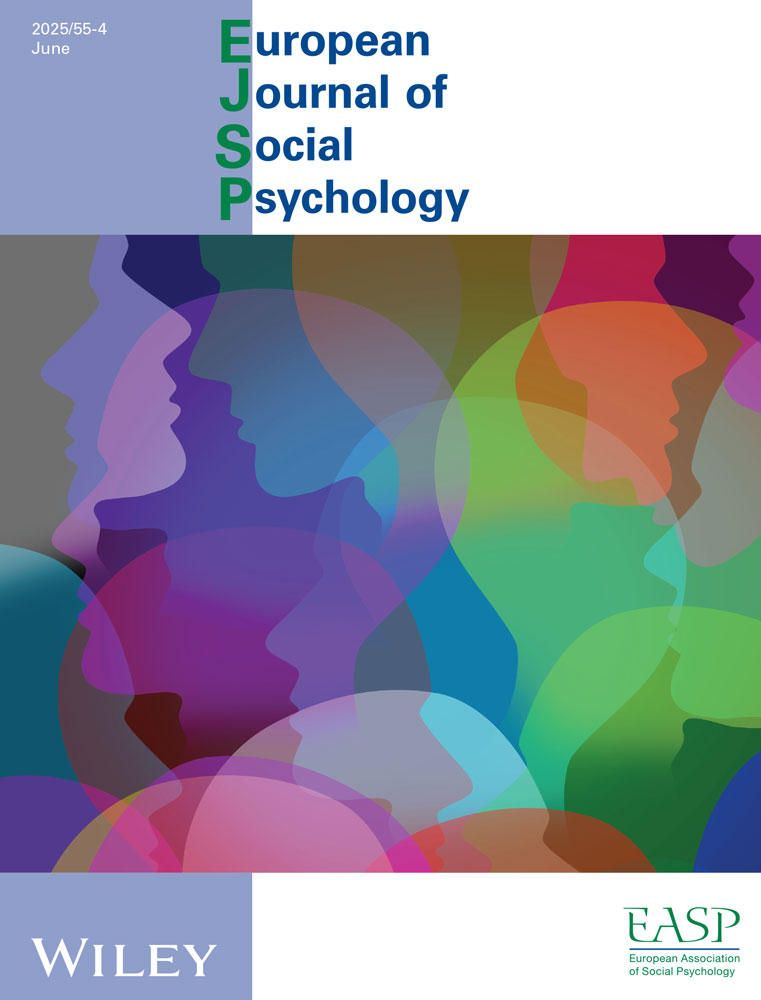When political expertise moderates the impact of scandals on young adults' judgments of politicians
Corresponding Author
Isabelle Régner
University of Toulouse, France
Université Toulouse Le Mirail, Laboratoire Dynamiques Sociocognitives et Vie Politique, Maison de la Recherche, 5 allées Antonio-Machado, 31058 Toulouse Cedex 9, France.Search for more papers by this authorCorresponding Author
Isabelle Régner
University of Toulouse, France
Université Toulouse Le Mirail, Laboratoire Dynamiques Sociocognitives et Vie Politique, Maison de la Recherche, 5 allées Antonio-Machado, 31058 Toulouse Cedex 9, France.Search for more papers by this authorAbstract
This short note investigated how expertise in a political scandal moderates whether the activation of this scandal produces assimilation in the evaluation of politicians in general and contrast in the evaluation of specific politicians. It was hypothesized that participants with a rich knowledge about the scandal would display the assimilation and contrast effects whereas those with a poorer knowledge would not. Results tended to support this prediction, suggesting that the impact on judgment of a specific context depends on the amount of knowledge participants possess about this context. Copyright © 2005 John Wiley & Sons, Ltd.
REFERENCES
- Alba, J., & Hutchinson, J. (1987). Dimensions of consumer expertise. Journal of Consumer Research, 13, 411–454.
- Alwin, D. F., & Krosnick, J. A. (1991). Aging, cohorts and the stability of socio-political orientations over the life-span. American Journal of Sociology, 97, 169–195.
- Bickart, B. (1992). Question-order effects and brand evaluations: The moderating role of consumer knowledge. In N. Schwarz, & S. Sudman (Eds.), Context effects in social and psychological research (pp. 63–80). New York: Springer-Verlag.
10.1007/978-1-4612-2848-6_6 Google Scholar
- Bless, H., & Schwarz, N. (1998). Context effects in political judgments: Assimilation and contrast as a function of categorization processes. European Journal of Social Psychology, 28, 159–172. DOI: 10.1002/ejsp. 86.
- Bless, H., Igou, E. R., Schwarz, N., & Wänke, M. (2000). Reducing context effects by adding context information: The direction and size of context effects in political judgment. Personality and Social Psychology Bulletin, 26, 1036–1045.
- Bless, H., Schwarz, N., & Wänke, M. (2003). The size of context effects in social judgment. In J. P. Forgas, K. D. Williams, & W. von Hippel (Eds.), Social judgments. Implicit and explicit processes (pp. 180–197). Cambridge: Cambridge University Press.
- Chanley, V. A., Rudolph, T. J., & Rahn, W. M. (2000). The origins and consequences of public trust in government. Public Opinion Quarterly, 64, 239–256.
- Domke, D., Shah, D. V., & Wackman, D. B. (2000). Rights and morals, issues, and candidate integrity: Insights into the role of the news media. Political Psychology, 21, 641–665.
- Garment, S. (1991). Scandal: The culture of mistrust in American politics. New York: Doubleday.
- Halstead, T. (1999). A politics for generation X. The Atlantic Monthly, 284, 33–42.
- Herr, P. M. (1986). Consequences of priming: Judgment and behavior. Journal of Personality and Social Psychology, 51, 1106–1115.
- Hetherington, M. J. (1999). The effect of political trust on the presidential vote, 1968–96. American Political Science Review, 93, 311–326.
- Iyengar, S., & Kinder, D. R. (1987). News that matters: Television and American opinion. Chicago: University of Chicago Press.
- Iyengar, S., Kinder, D. R., Peters, M. D., & Krosnick, J. A. (1984). The evening news and presidential evaluations. Journal of Personality and Social Psychology, 46, 778–787.
- Judd, C. M., & Downing, J. W. (1990). Political expertise and the development of attitude consistency. Social Cognition, 8, 104–124.
- Judd, C. M., & Krosnick, J. A. (1989). The structural bases of consistency among political attitudes: Effects of political expertise and attitude importance. In A. R. Pratkanis, S. J. Breckler, & A. G. Greenwald (Eds.), Attitude structure and function. Hillsdale, NJ: Erlbaum.
- Krosnick, J. A. (1990). Expertise and political psychology. Social Cognition, 8, 1–8.
- Krosnick, J. A., & Abelson, R. P. (1992). The case for measuring attitude strength. In J. M. Tanur (Ed.), Questions about questions (pp. 177–203). New York: Russell Sage.
- Losier, G. F., & Koestner, R. (1999). Intrinsic versus identified regulation in distinct political campaigns: The consequences of following politics for pleasure versus personal meaningfulness. Personality and Social Psychology Bulletin, 25, 287–298.
- Losier, G. F., Perreault, S., Koestner, R., & Vallerand, R. J. (2001). Examining individual differences in the internalization of political values: Validation of the self-determination scale of political motivation. Journal of Research in Personality, 35, 41–61.
- Miller, J. M., & Krosnick, J. A. (1996). News media impact on the ingredients of presidential evaluations: A program of research on the priming hypothesis. In D. Mutz, & P. Sniderman (Eds.), Political persuasion and attitude change. Ann Arbor, MI: University of Michigan Press.
- Miller, J. M., & Krosnick, J. A. (2000). News media impact on the ingredients of presidential evaluations: Politically knowledgeable citizens are guided by a trusted source. American Journal of Political Science, 44, 295–309.
- Mussweiler, T. (2003). Comparison processes in social judgment: Mechanisms and consequences. Psychological Review, 110, 472–489.
- Schwarz, N., & Bless, H. (1992). Scandals and the public's trust in politicians: Assimilation and contrast effects. Personality and Social Psychology Bulletin, 18, 574–579.
- Schweisguth, E. (2002). La dépolitisation en questions. In G. Grunberg, N. Mayer, & P. M. Sniderman (Eds.), La démocratie à l'épreuve. Une nouvelle approche de l'opinion des français. Paris: Presses de Sciences Po.
- Sidanius, J. (1988). Political sophistication and political deviance: A structural equation examination of context theory. Journal of Personality and Social Psychology, 55, 37–51.
- Wänke, M., Bless, H., & Schwarz, N. (1998). Context effects in product line extensions: Context is not destiny. Journal of Consumer Psychology, 7, 299–322.
10.1207/s15327663jcp0704_01 Google Scholar




